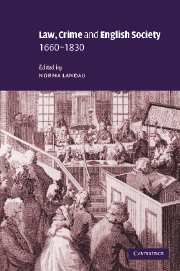Book contents
- Frontmatter
- Contents
- List of figures
- Notes of contributors
- 1 Introduction
- Part 1 Law
- 2 Dread of the Crown Office: the English magistracy and King's Bench, 1740–1800
- 3 The trading justice's trade
- 4 Impressment and the law in eighteenth-century Britain
- Part 2 Crime
- Part 3 Society
- John M. Beattie's publications
- Index
3 - The trading justice's trade
from Part 1 - Law
Published online by Cambridge University Press: 30 June 2009
- Frontmatter
- Contents
- List of figures
- Notes of contributors
- 1 Introduction
- Part 1 Law
- 2 Dread of the Crown Office: the English magistracy and King's Bench, 1740–1800
- 3 The trading justice's trade
- 4 Impressment and the law in eighteenth-century Britain
- Part 2 Crime
- Part 3 Society
- John M. Beattie's publications
- Index
Summary
The justices of eighteenth-century metropolitan London were a byword for corruption. In fact, they had a byword all to themselves: they were known as ‘trading justices’. Like their label, their reputation was unique. Its idiosyncracy was not merely the charge that their judicial decisions were suspect, as were the profits they extracted from office. Long before the English had identified the trading justices, they had known ‘basket justices’ – justices who relished the fees of office, who pocketed the fines they levied when making summary convictions, and whose judicial decisions could be influenced by the gift of half a dozen chickens. Unappealing as the English found such justices, their animus against the trading justice was greater still, so great that it colours these justices' portrayal to this day. According to a recent presentation, trading justices were corrupt, some so corrupt that they were ‘indistinguishable from the criminals with whom they dealt’. While quite striking, even this depiction pales before that presented in the eighteenth century. For to the eighteenth century, the trading justice was not merely criminal; he actually caused crime. According to one pamphleteer, trading justices connived at ‘the continuance of what tends to the increase of delinquency’. According to a member of Parliament, trading justices ‘frequently let felons esape, unless they could make money by convicting them’. As the Times stated: ‘the trade of thieving will ever thrive, whilst there exists a trade of Justices’. This chapter will suggest why such statements did not seem outrageous.
- Type
- Chapter
- Information
- Law, Crime and English Society, 1660–1830 , pp. 46 - 70Publisher: Cambridge University PressPrint publication year: 2002
- 9
- Cited by

